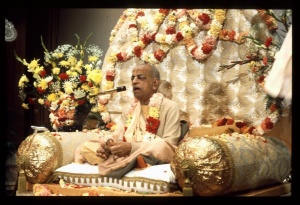SB 1.8.11: Difference between revisions
m (1 revision(s)) |
(Vanibot #0054 edit - transform synonyms into clickable links, which search similar occurrences) |
||
| (One intermediate revision by one other user not shown) | |||
| Line 1: | Line 1: | ||
{{info | {{info | ||
|speaker= | |speaker=Sūta Gosvāmī | ||
|listener=Sages of | |listener=Sages of Naimiṣāraṇya | ||
}} | }} | ||
[[Category:Srimad-Bhagavatam - Canto 01 Chapter 08]] | |||
[[Category:Bhagavatam Verses Spoken by Suta Gosvami - Vanisource|010811]] | |||
<div style="float:left">'''[[Srimad-Bhagavatam]] - [[SB 1|First Canto]] - [[SB 1.8: Prayers by Queen Kunti and Pariksit Saved|Chapter 8: Prayers by Queen Kuntī and Parīkṣit Saved]]'''</div> | |||
<div style="float:right">[[File:Go-previous.png|link=SB 1.8.10]] '''[[SB 1.8.10]] - [[SB 1.8.12]]''' [[File:Go-next.png|link=SB 1.8.12]]</div> | |||
{{CompareVersions|SB|1.8.11|SB 1964|SB 1972-77}} | |||
{{RandomImage}} | |||
==== TEXT 11 ==== | ==== TEXT 11 ==== | ||
<div | <div class="verse"> | ||
sūta uvāca | :sūta uvāca | ||
upadhārya vacas tasyā | :upadhārya vacas tasyā | ||
bhagavān bhakta-vatsalaḥ | :bhagavān bhakta-vatsalaḥ | ||
apāṇḍavam idaṁ kartuṁ | :apāṇḍavam idaṁ kartuṁ | ||
drauṇer astram abudhyata | :drauṇer astram abudhyata | ||
</div> | </div> | ||
| Line 18: | Line 24: | ||
==== SYNONYMS ==== | ==== SYNONYMS ==== | ||
<div | <div class="synonyms"> | ||
sūtaḥ | ''[//vanipedia.org/wiki/Special:VaniSearch?s=sūtaḥ&tab=syno_o&ds=1 sūtaḥ] [//vanipedia.org/wiki/Special:VaniSearch?s=uvāca&tab=syno_o&ds=1 uvāca]'' — Sūta Gosvāmī said; ''[//vanipedia.org/wiki/Special:VaniSearch?s=upadhārya&tab=syno_o&ds=1 upadhārya]'' — by hearing her patiently; ''[//vanipedia.org/wiki/Special:VaniSearch?s=vacaḥ&tab=syno_o&ds=1 vacaḥ]'' — words; ''[//vanipedia.org/wiki/Special:VaniSearch?s=tasyāḥ&tab=syno_o&ds=1 tasyāḥ]'' — her; ''[//vanipedia.org/wiki/Special:VaniSearch?s=bhagavān&tab=syno_o&ds=1 bhagavān]'' — the Personality of Godhead; ''[//vanipedia.org/wiki/Special:VaniSearch?s=bhakta&tab=syno_o&ds=1 bhakta]-[//vanipedia.org/wiki/Special:VaniSearch?s=vatsalaḥ&tab=syno_o&ds=1 vatsalaḥ]'' — He who is very much affectionate towards His devotees; ''[//vanipedia.org/wiki/Special:VaniSearch?s=apāṇḍavam&tab=syno_o&ds=1 apāṇḍavam]'' — without the existence of the Pāṇḍavas' descendants; ''[//vanipedia.org/wiki/Special:VaniSearch?s=idam&tab=syno_o&ds=1 idam]'' — this; ''[//vanipedia.org/wiki/Special:VaniSearch?s=kartum&tab=syno_o&ds=1 kartum]'' — to do it; ''[//vanipedia.org/wiki/Special:VaniSearch?s=drauṇeḥ&tab=syno_o&ds=1 drauṇeḥ]'' — of the son of Droṇācārya; ''[//vanipedia.org/wiki/Special:VaniSearch?s=astram&tab=syno_o&ds=1 astram]'' — weapon; ''[//vanipedia.org/wiki/Special:VaniSearch?s=abudhyata&tab=syno_o&ds=1 abudhyata]'' — understood. | ||
</div> | </div> | ||
| Line 25: | Line 31: | ||
==== TRANSLATION ==== | ==== TRANSLATION ==== | ||
<div | <div class="translation"> | ||
Sūta Gosvāmī said: Having patiently heard her words, Lord Śrī Kṛṣṇa, who is always very affectionate to His devotees, could at once understand that Aśvatthāmā, the son of Droṇācārya, had thrown the brahmāstra to finish the last life in the Pāṇḍava family. | Sūta Gosvāmī said: Having patiently heard her words, Lord Śrī Kṛṣṇa, who is always very affectionate to His devotees, could at once understand that Aśvatthāmā, the son of Droṇācārya, had thrown the brahmāstra to finish the last life in the Pāṇḍava family. | ||
</div> | </div> | ||
| Line 32: | Line 38: | ||
==== PURPORT ==== | ==== PURPORT ==== | ||
<div | <div class="purport"> | ||
The Lord is impartial in every respect, but still He is inclined towards His devotees because there is a great necessity of this for everyone's wellbeing. The Pāṇḍava family was a family of devotees, and therefore the Lord wanted them to rule the world. That was the reason He vanquished the rule of the company of Duryodhana and established the rule of Mahārāja Yudhiṣṭhira. Therefore, He also wanted to protect Mahārāja Parīkṣit, who was lying in embryo. He did not like the idea that the world should be without the Pāṇḍavas, the ideal family of devotees. | The Lord is impartial in every respect, but still He is inclined towards His devotees because there is a great necessity of this for everyone's wellbeing. The Pāṇḍava family was a family of devotees, and therefore the Lord wanted them to rule the world. That was the reason He vanquished the rule of the company of Duryodhana and established the rule of Mahārāja Yudhiṣṭhira. Therefore, He also wanted to protect Mahārāja Parīkṣit, who was lying in embryo. He did not like the idea that the world should be without the Pāṇḍavas, the ideal family of devotees. | ||
</div> | </div> | ||
__NOTOC__ | |||
<div style="float:right; clear:both;">[[File:Go-previous.png|link=SB 1.8.10]] '''[[SB 1.8.10]] - [[SB 1.8.12]]''' [[File:Go-next.png|link=SB 1.8.12]]</div> | |||
__NOTOC__ | |||
__NOEDITSECTION__ | |||
Latest revision as of 18:14, 17 February 2024

A.C. Bhaktivedanta Swami Prabhupada
TEXT 11
- sūta uvāca
- upadhārya vacas tasyā
- bhagavān bhakta-vatsalaḥ
- apāṇḍavam idaṁ kartuṁ
- drauṇer astram abudhyata
SYNONYMS
sūtaḥ uvāca — Sūta Gosvāmī said; upadhārya — by hearing her patiently; vacaḥ — words; tasyāḥ — her; bhagavān — the Personality of Godhead; bhakta-vatsalaḥ — He who is very much affectionate towards His devotees; apāṇḍavam — without the existence of the Pāṇḍavas' descendants; idam — this; kartum — to do it; drauṇeḥ — of the son of Droṇācārya; astram — weapon; abudhyata — understood.
TRANSLATION
Sūta Gosvāmī said: Having patiently heard her words, Lord Śrī Kṛṣṇa, who is always very affectionate to His devotees, could at once understand that Aśvatthāmā, the son of Droṇācārya, had thrown the brahmāstra to finish the last life in the Pāṇḍava family.
PURPORT
The Lord is impartial in every respect, but still He is inclined towards His devotees because there is a great necessity of this for everyone's wellbeing. The Pāṇḍava family was a family of devotees, and therefore the Lord wanted them to rule the world. That was the reason He vanquished the rule of the company of Duryodhana and established the rule of Mahārāja Yudhiṣṭhira. Therefore, He also wanted to protect Mahārāja Parīkṣit, who was lying in embryo. He did not like the idea that the world should be without the Pāṇḍavas, the ideal family of devotees.